The Dictatorship
Trump’s emerging Gaza aid plan is not serious

The Trump administration says it is taking steps to help alleviate starvation in the Gaza Strip induced by Israel’s genocidal restriction of food into the enclave. But based on what we know so far, the efforts would fail to address the real problems with the flow of aid into Gaza — and could provide political cover for Israel as it carries on with its assault on civilian life in the territory.
U.S. Ambassador to Israel Mike Huckabee signaled Wednesday that the U.S. will take a more prominent role in expanding the Gaza Humanitarian Foundation’s distribution of food in Gaza. He said in an interview with Fox News that the plan is to expand the number of sites distributing food from four to 16. Huckabee also said the sites would operate for longer periods of time; while sites in some cases have opened for mere minutes before announcing they’re out of food, Huckabee said that in the future they could operate for “as much as 24 hours a day.”
This would be an incremental improvement, but akin to placing a Band-Aid on a gaping wound — while also stabbing the patient elsewhere.
This would be an incremental improvement, but akin to placing a Band-Aid on a gaping wound — while also stabbing the patient elsewhere. Here’s why.
The Gaza Humanitarian Foundation is, by its very design, a terrible way to distribute aid to Gaza. Gaza is under a blockade, and prior to May, the United Nations and its partner humanitarian organizations provided food throughout the enclave. The U.N. infrastructure was long-standing, had hundreds of distribution sites and was capable of handing out fresh meals and supplies door-to-door. For more than two months this spring, however, Israel blocked all food and other vital items into the enclave and then largely replaced the U.N. infrastructure with a slapdash operation called the Gaza Humanitarian Foundation.
The GHF is a private group backed by the U.S. and Israel and, according to The Washington Postwas conceived of by an “ad hoc group of Israeli business representatives, the Israel Defense Forces and U.S. private security consultants.” And its emergence as a de facto replacement for U.N. infrastructure is crucial for understanding Israel’s current starvation regime. It reduced primary distribution of food to just four sites, and three out of its four initial sites are in the southern part of the Gaza Strip, making it hard for much of the population to access food. Moreover, the sites provide a much smaller range of food that is not suitable for children or starving populations, and all the sites are in military zones; accessing them is incredibly dangerous. As I explained in a recent pieceGHF sites create a horrifying dilemma for Gazans by forcing them to choose between starving or risking being shot:
Close to a thousand people have been shot and killed while seeking food, according to the United Nations. A former retired Green Beret who worked at the GHF sites said that they ‘were designed as death traps’ and that he witnessed civilians being targeted. (‘Death trap’ is also the term used by a U.N. official to describe the new system.) Humanitarian and famine experts say that the program can’t possibly feed everyone in the territory and that it also ‘humiliates and undermines’ the population. In other words, the GHF is perfectly designed to allow Israel to say it’s doing something for Gaza while winnowing down the population.
Even with 16 sites instead of four and longer periods of service, the aid distribution sites would still be a far cry from the U.N. infrastructure that was already in place and already working. The Trump administration is not addressing the fundamental problem of scrapping the neutral administration of humanitarian aid. Instead, it is doubling down on investing in a militarized humanitarian operation, one backed by a country that has used the cutting off of food, water, medicine and other vital supplies as a weapon of war since the beginning of its operation.
The ostensible pretext for Israel to pivot from U.N. distribution to the GHF were claims that Hamas was stealing aid. But The New York Times, citing two senior Israeli military officials and two other Israelis involved in the matter, reported in July that “the Israeli military never found proof that the Palestinian militant group had systematically stolen aid from the United Nations” and that the U.N. aid system was “largely effective.” (Israel’s government officially maintains that Hamas stole substantial amounts of aid.)
Reuters also recently reported that an internal U.S. government study conducted by the U.S. Agency for International Development “found no evidence of systematic theft” of goods by Hamas. (A White House spokesperson claimed no State Department official had seen the study and said it “was likely produced by a deep state operative.”) What we do know is that a surge in starvation-related deaths in Gaza came after Israel paused aid and instituted the GHF.
There’s reason to fear even incremental improvement of the GHF will be poorly executed. Last week, Huckabee visited the Gaza Strip alongside Trump’s Middle East envoy Steve Witkoff and called GHF’s operations an “incredible feat.” Ellie Burgos, an American critical care nurse volunteering at Nasser Hospital in Khan Younis, told NBC News, “It was a PR stunt, a controlled visit supervised and dictated by the Israeli military.” (NBC News also reported that “on the day of the visit, at least 92 people were killed on Friday across Gaza, including 51 people who were seeking aid.”) The Trump administration is clearly willing to airbrush and downplay the harsh realities on the ground, which should give us reason to doubt that it’ll hold a high bar when trying to allow more food into the enclave.
Ultimately, the core problem is Israel’s endless military operation in Gaza, which it resumed in March after it unilaterally withdrew from a ceasefire deal with Hamas. If the Trump administration were serious about helping Gaza, then it would pressure Israel to end a war that hundreds of ex-Israeli security officials have said no longer serves any military purpose against Hamas and call for an end to a blockade that treats civilians as targets of war. But there is no evidence that the Trump administration desires a serious solution.
Zeeshan Aleem is a writer and editor for BLN Daily. Previously, he worked at Vox, HuffPost and Blue Light News, and he has also been published in, among other places, The New York Times, The Atlantic, The Nation, and The Intercept. You can sign up for his free politics newsletter here.
The Dictatorship
NEW: Several European leaders to join Zelenskyy at White House meeting Monday


-
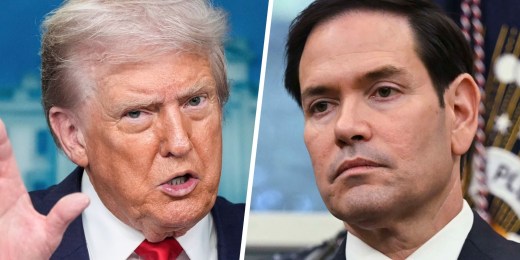
Dem Rep. calls out Trump team for doing damage control after Putin summit
06:52
-

Why a land swap in Ukraine’s Donbas has more nuance to it than Trump thinks
08:50
-
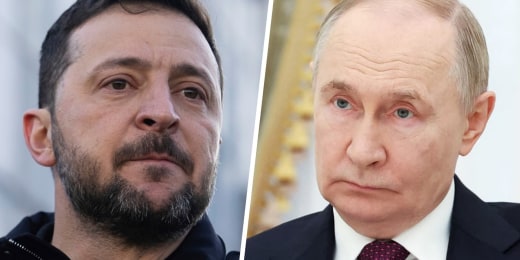
Trump floats land swap in Ukraine with allies seeing it as a non-starter for a peace deal
10:32
-

Epstein survivor shares stark reminder to parents on why Ghislaine Maxwell deserves her sentence
08:08
-
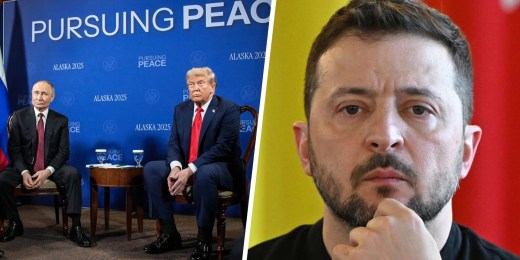
Ukraine safety remains unclear as Trump teases U.S. pledge of security guarantees
07:35
-
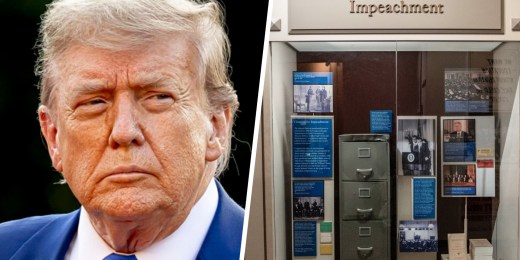
Why Trump’s rewriting of history at the Smithsonian should concern you
04:27
-
Now Playing

-
UP NEXT

Texas Gov. Abbott blasted for special session on gerrymandering failing again
03:55
-

Ukraine war no closer to an end after Trump-Putin summit: Fmr. Ambassador to Ukraine
10:20
-

Fmr. Amb. to Ukraine reacts to NYT reporting Trump backs Ukraine giving up land
11:05
-

The stock market-economy dynamic that’s baffling economists
04:19
-

How flattery plays a role in Trump’s foreign affairs after Putin summit
06:47
-
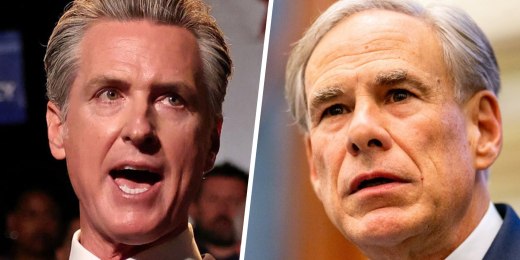
Do Democrats have anything to lose in using Republican gerrymandering tactics against them?
06:08
-
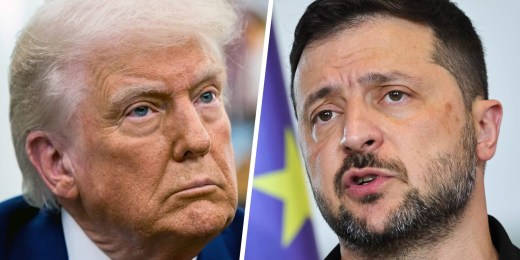
NEW: Trump floats U.S., NATO-like security guarantees for Ukraine as part of Russia peace deal
03:10
-

Texas Governor warns protesting Democrats they’ll be arrested if they return to the state
04:53
-
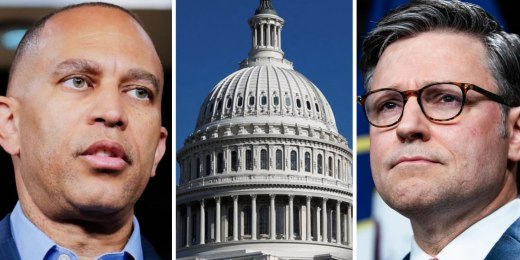
Former DNC Chair calls for a resilient Congress to take charge against gerrymandering efforts
06:34
-
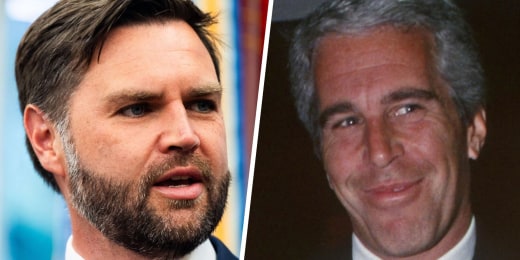
Vice President Vance denies Epstein was discussed at White House strategy meeting
08:46
-

Trump has made concessions to Putin already before Ukraine summit: Fmr. CIA official
06:37
-

Are CEOs currying favor with Trump through lavish gifts and flattery?
05:29
-
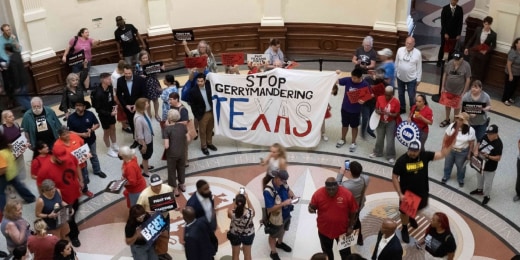
Texas Democrats face arrest and bomb threats amid their standoff with Republican gerrymandering
06:26
-
UP NEXT

Dem Rep. calls out Trump team for doing damage control after Putin summit
06:52
-

Why a land swap in Ukraine’s Donbas has more nuance to it than Trump thinks
08:50
-

Trump floats land swap in Ukraine with allies seeing it as a non-starter for a peace deal
10:32
-

Epstein survivor shares stark reminder to parents on why Ghislaine Maxwell deserves her sentence
08:08
-

Ukraine safety remains unclear as Trump teases U.S. pledge of security guarantees
07:35
-

Why Trump’s rewriting of history at the Smithsonian should concern you
04:27
The Dictatorship
Why it matters that conservatives are claiming victory over Costco
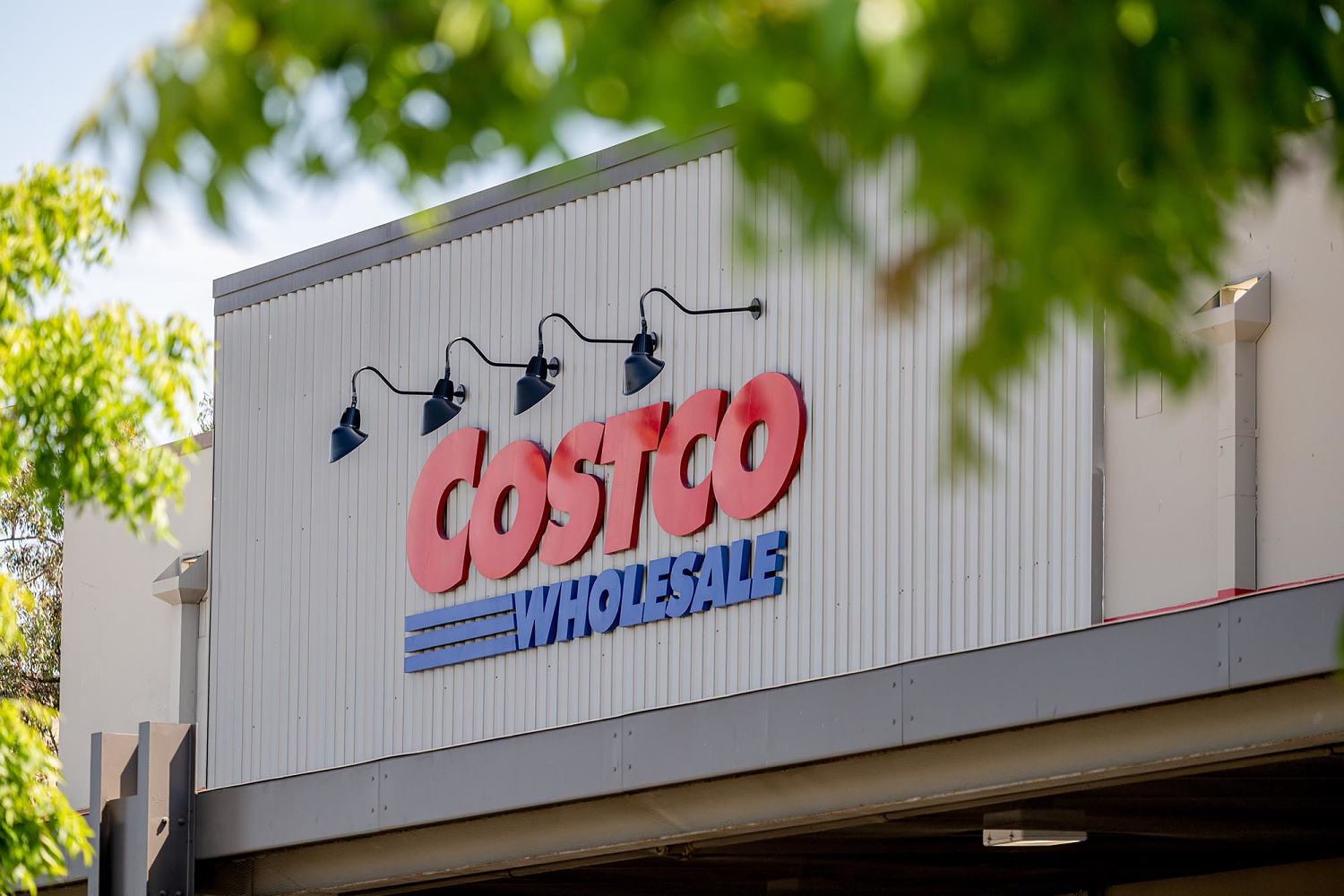
On Thursday, Costco said it would not begin stocking the abortion medication mifepristone at its more than 500 pharmacies, and conservative groups declared victory following a yearlong pressure campaign. Whether the groups are actually responsible for the wholesale chain’s decision is unclear, but they are framing it as a success and pledging to target retailers that already dispense the drug, which would be a blow to abortion access.
In August 2024, a coalition including far-right law firm Alliance Defending Freedom (ADF) and Inspire Investing — which bills itself as “empowering Christian investors through biblically responsible investing” — sent letters to Costco, Walmart, Kroger, Albertsons and McKesson urging them not to start dispensing mifepristone. The letter to Costco in particular claimed that 6,000 members signed a petition for it not to stock the drug, implying that they might take their business elsewhere.
A coalition including far-right law firm Alliance Defending Freedom and Inspire Investing — which bills itself as “empowering Christian investors through biblically responsible investing” — sent letters to Costco, Walmart, Kroger, Albertsons and McKesson urging them not to start dispensing mifepristone.
In a statement shared with BLN, Costco said, “Our position at this time not to sell mifepristone, which has not changed, is based on the lack of demand from our members and other patients, who we understand generally have the drug dispensed by their medical providers.”
The company did not respond to a follow-up question about how it assessed demand for a medication it doesn’t dispense. The potential interest wouldn’t be limited to the chain’s paid members, as nonmembers can fill prescriptions at its pharmacies. It also wouldn’t be cabined to abortions, since mifepristone is used off label to manage miscarriages.
The Washington Post reports that Costco had deliberated for more than a year about whether to offer mifepristone and decided this month not to do so; the paper cites anonymous sources familiar with the conversations.
Still, ADF is taking credit for Costco maintaining the status quo. As the organization’s corporate engagement legal counsel Michael Ross told Bloomberg News“It’s a very significant win and it’s one we hope to build on this coming year.” Ross added that ADF will turn its focus to CVS and Walgreens, which have been dispensing the drug in states where abortion is legal since early 2024.
It’s a relatively recent development that pharmacies could even stock this drug, which is typically used alongside misoprostol to end an early pregnancy, and conservatives are trying everything they can to shove the genie back in the bottle.
Mifepristone has long been overregulated in the U.S., and for two decades after its approval, the medication had to be dispensed in person by the health care provider who prescribed it. The Covid pandemic led to prescriptions via telemedicine that could be fulfilled by mail-order pharmacies, a change made permanent in late 2021. Then, in January 2023, the Food and Drug Administration said for the first time that brick-and-mortar pharmacies could dispense the drug. CVS and Walgreens swiftly announced plans to stock the medication in states where it was legal.
A month later, 20 Republican attorneys general wrote to CVS and Walgreens and claimed that they might be in violation of a federal law known as the Comstock Act, an anti-obscenity statute passed in 1873. Conservatives have argued that the long-dormant law prohibits sending abortion-causing drugs and devices through the mail or carriers like UPS and FedEx. But the same day as the pharmacy change, the Biden administration’s Department of Justice released legal guidance saying that the Comstock Act can’t be enforced against the shipment of abortion drugs as long as the sender doesn’t know the pills will be used illegally.
ADF’s letters to Costco and others cited the AGs’ claims on Comstock, and lobbed a threat that a change in administration could result in federal prosecutions should the retailers begin stocking mifepristone. “Last year, 20 attorneys general wrote letters advising pharmacies that receiving and dispensing the drug by mail is expressly prohibited by the Comstock Act and many state laws. Violating the Comstock Act alone carries a prison sentence of up to ten years,” the letters read. “The statute of limitations is five years, so the current political leadership at the U.S. Department of Justice cannot provide you cover if the administration changes parties.”
The bigger picture here is that groups like ADF are not satisfied with only conservative-led states passing abortion bans. Their long-term goal is to ban nearly all abortions nationwide under the 14th Amendmentand they’re hoping that courts will aid them along the way to realizing that project by ruling that the Comstock Act is enforceable, or that the FDA was wrong to allow telemedicine prescriptions, or both.
ADF took a case to the Supreme Court in 2024 from physicians seeking to end telemedicine prescriptions, and while the justices said those plaintiffs didn’t have standing to sue, that litigation continues thanks to three state AGs who joined the case. Missouri AG Andrew Bailey, who organized the letter to CVS and Walgreens, is leading that case. Most of the other AGs who signed the pharmacy letter have also signed an amicus brief supporting the lawsuit.
Abortion pills were used in nearly two-thirds of all documented terminations in the U.S. in 2023, and by the end of 2024, about 1 in 4 abortions were provided via telemedicine. Pharmacies stocking abortion pills would make them more accessible than they already are, which is a threat to conservatives’ current ban-by-a-thousand-cuts strategy.
Abortion pills were used in nearly two-thirds of all documented terminations in the U.S. in 2023.
The Costco pressure campaign underscores that GOP lawmakers and groups like ADF know an abortion ban cannot pass Congress, so they are trying to limit access in other ways, namely by targeting pills and working to shutter clinics. Their goal is to make it so people can only get abortion medication by physically traveling to a shrinking number of clinics, with more set to shutter amid fallout from the GOP budget bill that “defunds” large abortion providers like Planned Parenthood.
Planned Parenthood has said that as many as 200 of its clinics could close as a result of the bill, including 75% of its abortion-providing clinics across 12 states. That’s why the organization calls the law a backdoor abortion ban. Making abortion less accessible functions as an effective ban for some women — all before a possible nationwide ban is in place.
This context is why it’s so disappointing that Costco will not dispense mifepristone, a necessary medication for people who need abortions and people experiencing miscarriages — and one that is set to become increasingly difficult to access. ADF added in a press release after the Bloomberg story that it “applaud[s] Costco for doing the right thing by its shareholders and resisting activist calls to sell abortion drugs.” This isn’t about “selling” abortion pills. It’s about pharmacies being willing to dispense medications that people’s doctors have prescribed them.
The Costco statement said it believed that people “generally” have mifepristone dispensed by their medical providers, not pharmacies. While many people do still receive the pill directly from their doctor either in person or by mailtelemedicine prescriptions are increasingly filled by mail-order pharmacies like Honeybee Healthand of course other pharmacies do dispense the drug. Just not Costco.
Later in the ADF release, the group claimed that dispensing abortion pills is a bad business decision. “Retailers like Costco keep their doors open by selling a lifetime of purchases to families, both large and small,” Ross said. “They have nothing to gain and much to lose by becoming abortion dispensaries. Retail pharmacies exist to serve the health and wellness of their customers, but abortion drugs like mifepristone undermine that mission by putting women’s health at risk.”
Data shows that abortion restrictions are not only bad for people’s healthbut also bad for the economy. The landmark Turnaway Study found that women denied abortions are four times as likely to live below the federal poverty level than women who got care. And in June, the Institute for Women’s Policy Research (IWPR) estimated that the Dobbs decision has led to $64 billion in economic losses each year in the 16 states that ban or heavily restrict abortion. Nationwide, IWPR estimates that bans and other restrictions keep about 550,000 women out of the labor force annually, which is enough to impact GDP, they say.
Corporations may not care about trying to prevent a nationwide abortion access crisis, but they should care about protecting their profits and shareholder value.
SUSPAN goals
Susan Rinkunas is an independent journalist and co-founder of Autonomy News. Her work has appeared in Jezebel, The New Republic, The Guardian, Slate, The Nation and more.
The Dictatorship
Vacationing in the United Kingdom, JD Vance is greeted with mocking meme


By Are Salam
JD Vance’s track record of eventful travel is stretching on, as the vice president continues to get trolled at home and abroad. Vance and his family traveled last week to the Cotswolds in the United Kingdom — where a British activist group called Everybody Hates Elon rented a truck that displayed an unflattering meme of Vance as it followed him around the countryside.
The image, which shows a bald and wide-eyed Vance with plump cheeks, is the same one that a 21-year old Norwegian tourist said led to him being denied entry to the U.S. after customs officials discovered it on his phone. (U.S. Customs and Border Protection has said the Norwegian was denied entry for admitted drug use.)
Vance’s visit to the Cotswolds also gave locals the opportunity to celebrate — by way of a so-called ‘Vance not welcome party.’ A spokesperson for the Stop Trump Coalition, which organized the protest, told CNBC on Wednesday that the gathering of around 80 people — mostly locals — was ‘joyous,’ with a ‘wonderful’ atmosphere.
Meanwhile, in nearby Oxfordshire, residents in the typically quiet area have expressed annoyance at Vance and his large motorcade.

On a recent trip to his home state of Ohio for his 41st birthday, Vance’s security detail requested that the Army Corps of Engineers raise the water levels of the Little Miami River ahead of a family kayaking trip — a move that’s drawing scrutiny from congressional Democrats.
Vance also encountered protesters earlier this year during a ski vacation in Vermont.
Last month, Vance and his family visited Disneyland in Southern California, as federal agents conducted immigration raids nearby in Los Angeles.
“Sorry to all the people who were at Disneyland for the longer lines, but we had a very good time,” Vance said afterward, speaking on the podcast of Katie Miller, the wife of White House deputy chief of staff Stephen Miller.
Vance also told Miller that he really wants to go to Hawaii.
“Hopefully, we can find some excuse as vice president of the United States to go to Hawaii,” Vance told Miller. “Kamala Harris went to Hawaii, so we should be able to find some excuse to go to Hawaii.”

Erum Salam is a breaking news reporter and producer for BLN Digital. She previously was a breaking news reporter for The Guardian.
-
Uncategorized9 months ago
Bob Good to step down as Freedom Caucus chair this week
-

 The Josh Fourrier Show9 months ago
The Josh Fourrier Show9 months agoDOOMSDAY: Trump won, now what?
-

 Politics9 months ago
Politics9 months agoWhat 7 political experts will be watching at Tuesday’s debate
-

 Politics9 months ago
Politics9 months agoHow Republicans could foil Harris’ Supreme Court plans if she’s elected
-
Economy9 months ago
Fed moves to protect weakening job market with bold rate cut
-

 Politics9 months ago
Politics9 months agoRFK Jr.’s bid to take himself off swing state ballots may scramble mail-in voting
-

 Politics6 months ago
Politics6 months agoFormer ‘Squad’ members launching ‘Bowman and Bush’ YouTube show
-

 The Dictatorship6 months ago
The Dictatorship6 months agoPete Hegseth’s tenure at the Pentagon goes from bad to worse












